Related Research Articles
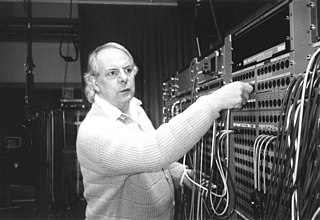
Karlheinz Stockhausen was a German composer, widely acknowledged by critics as one of the most important but also controversial composers of the 20th and early 21st centuries. He is known for his groundbreaking work in electronic music, having been called the "father of electronic music", for introducing controlled chance into serial composition, and for musical spatialization.
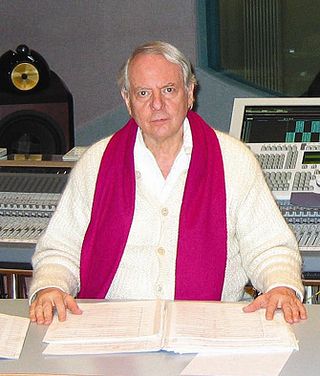
Gesang der Jünglinge is an electronic music work by Karlheinz Stockhausen. It was realized in 1955–56 at the Westdeutscher Rundfunk studio in Cologne and is Work Number 8 in the composer's catalog. The vocal parts were supplied by 12-year-old Josef Protschka. It is exactly 13 minutes, 14 seconds long.
David C. Johnson was an American composer, flautist, and performer of live electronic music.

The Cologne University of Music is a music college in Cologne, Germany. Founded in 1850, it is Europe's largest academy of music.
Gruppen for three orchestras (1955–57) is amongst the best-known compositions of German composer Karlheinz Stockhausen, and is Work Number 6 in the composer's catalog of works. Gruppen is "a landmark in 20th-century music ... probably the first work of the post-war generation of composers in which technique and imagination combine on the highest level to produce an undisputable masterpiece".
Herbert Eimert was a German music theorist, musicologist, journalist, music critic, editor, radio producer, and composer.
Die Reihe was a German-language music academic journal, edited by Herbert Eimert and Karlheinz Stockhausen and published by Universal Edition (Vienna) between 1955 and 1962. An English edition was published, under the original German title, between 1957 and 1968 by the Theodore Presser Company in association with Universal Edition (London). A related book series titled "Bücher der Reihe" was begun, but only one title ever appeared in it, Herbert Eimert's Grundlagen der musikalischen Reihentechnik.
New Simplicity was a stylistic tendency amongst some of the younger generation of German composers in the late 1970s and early 1980s, reacting against not only the European avant garde of the 1950s and 1960s, but also against the broader tendency toward objectivity found from the beginning of the twentieth century. Alternative terms sometimes used for this movement are "Inclusive Composition", "New Subjectivity", "New Inwardness", "New Romanticism", "New Sensuality", "New Expressivity", "New Classicism", and "New Tonality" (neotonality).
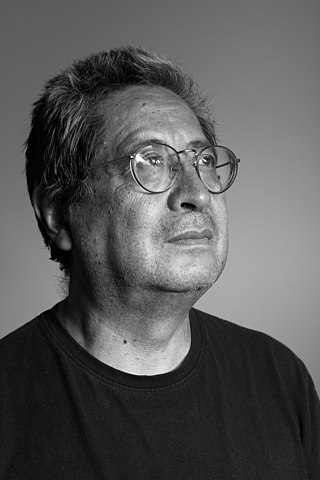
Mesías Maiguashca is an Ecuadorian composer and an advocate of Neue Musik, especially electroacoustic music.

Hymnen is an electronic and concrete work, with optional live performers, by Karlheinz Stockhausen, composed in 1966–67, and elaborated in 1969. In the composer's catalog of works, it is No. 22.
John McGuire is an American composer, pianist, organist, and music editor.
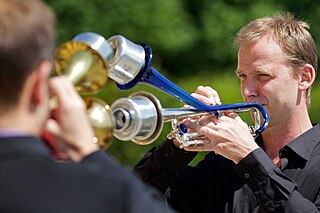
Marco Blaauw is a Dutch trumpet soloist known for his work in the field of new music and with Cologne-based contemporary music group Ensemble Musikfabrik. He plays a double bell trumpet, an invention that has allowed for numerous new compositions for trumpet, including those by Ernst von Siemens Music Prize winner, Rebecca Saunders. Blaauw is a consistent faculty member at the Darmstadt Summer Course, the Stockhausen Courses Kürten, the Lucerne Festival, and the Chosen Vale International Trumpet Seminar.

Klang —Die 24 Stunden des Tages is a cycle of compositions by Karlheinz Stockhausen, on which he worked from 2004 until his death in 2007. It was intended to consist of 24 chamber-music compositions, each representing one hour of the day, with a different colour systematically assigned to every hour. The cycle was unfinished when the composer died, so that the last three "hours" are lacking. The 21 completed pieces include solos, duos, trios, a septet, and Stockhausen's last entirely electronic composition, Cosmic Pulses. The fourth composition is a theatre piece for a solo percussionist, and there are also two auxiliary compositions which are not part of the main cycle. The completed works bear the work (opus) numbers 81–101.
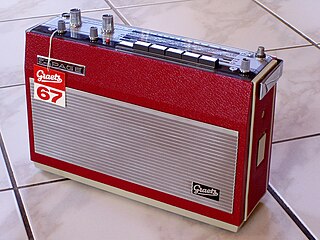
Kurzwellen, for six players with shortwave radio receivers and live electronics, is a composition by Karlheinz Stockhausen, written in 1968. It is Number 25 in the catalog of the composer's works.

Spiral, for a soloist with a shortwave receiver, is a composition by Karlheinz Stockhausen, written in 1968. It is Number 27 in the catalogue of the composer's works.
Studie II is an electronic music composition by Karlheinz Stockhausen from the year 1954 and, together with his Studie I, comprises his work number ("opus") 3. It is serially organized on all musical levels and was the first published score of electronic music.

Oktophonie (Octophony) is a 1991 octophonic electronic-music composition by Karlheinz Stockhausen. A component layer of act 2 of the opera Dienstag aus Licht, it may also be performed as an independent composition. It has a duration of 69 minutes.

The Oeldorf Group was a musicians' collective active in Germany in the 1970s. Based in the village of Oeldorf, near Cologne, their performances emphasized live-electronic music.

The Studio for Electronic Music of the West German Radio was a facility of the Westdeutscher Rundfunk (WDR) in Cologne. It was the first of its kind in the world, and its history reflects the development of electronic music in the second half of the twentieth century.

Ensemble is a group-composition project devised by Karlheinz Stockhausen for the 1967 Darmstädter Ferienkurse. Twelve composers and twelve instrumentalists participated, and the resulting performance lasted four hours. It is not assigned a work number in Stockhausen's catalogue of works.
References
- 1 2 Kapko-Foretić 1980, p. 50.
- ↑ Stockhausen 1971, p. 196.
- ↑ Custodis 2004, pp. 138–142.
- ↑ Fox 2007, pp. 27–28, 40.
- ↑ Fox 2007, p. 30.
- ↑ Custodis 2004, p. 186.
- ↑ Custodis 2004, pp. 188–189.
- ↑ Custodis 2004, p. 190.
- ↑ Custodis 2004, p. 189.
- ↑ Kapko-Foretić 1980, p. 54.
- ↑ Anderson 2013.
- ↑ Butzmann 2003.
- ↑ Enders 2011, p. 78.
- ↑ Reese 2008, pp. 100, 112.
- ↑ Schabbing 2008, p. 177.
Cited sources
- Anderson, Christine. 2013. Komponieren zwischen Reihe, Aleatorik und Improvisation: Franco Evangelistis Suche nach einer neuen Klangwelt. Sinefonia 18. Hofheim: Wolke Verlag. ISBN 9783936000788 (pbk).
- Butzmann, Frieder . 2003. Verfügbare Musik: Konsequenzen der Entwicklung von Tonaufnahme- und Wiedergabeverfahren. Positionen: Beiträge zur Neuen Musik, no. 56 (August): 7–12.
- Custodis, Michael. 2004. Die soziale Isolation der neuen Musik: Zum Kölner Musikleben nach 1945. Stuttgart: Franz Steiner Verlag. ISBN 978-3-515-08375-1.
- Enders, Bernd. 2011. "Der wohltemperierte Musikcomputer". In Zahlen, Zeichen und Figuren: Mathematische Inspirationen in Kunst und Literatur, edited by Andrea Albrecht , Gesa von Essen, Werner Frick , 47–82. Linguae & litterae 11. Berlin and Boston: Walter de Gruyter. ISBN 978-3-11-022905-9 (cloth); ISBN 3110229056 (e-book).
- Fox, Christopher. 2007. "Where the River Bends: The Cologne School in Retrospect". The Musical Times 148, no. 1901 (Winter): 27–42.
- Kapko-Foretić, Zdenka. 1980. "Kölnska škola avangarde". Zvuk: Jugoslavenska muzička revija, 1980 no. 2:50–55.
- Reese, Kirsten . 2008. "Geschlechtslose elektronische Musik? PerformerInnen am Laptop". In Performativität und Performance, edited by Martina Oster, Waltraud Ernst, and Marion Gerards, 99–109. Focus Gender 8. Münster: LIT Verlag. ISBN 978-3-8258-0660-6.
- Schabbing, Bernd . 2008. "Technik und Kunst: Wechselwirkungen und Bezügen”. In Technik zwischen "artes" und "arts", edited by Reinhold Bauer, James C. Williams, and Wolfhard Weber , 175–184. Münster, New York, Munich, and Berlin: Waxmann Verlag. ISBN 978-3-8309-2026-7.
- Stockhausen, Karlheinz. 1971. "Kölner Kurse für Neue Musik", in his Texte zur Musik 3, edited by Dieter Schnebel, 196–211. DuMont Dokumente. Cologne: DuMont Buchverlag.